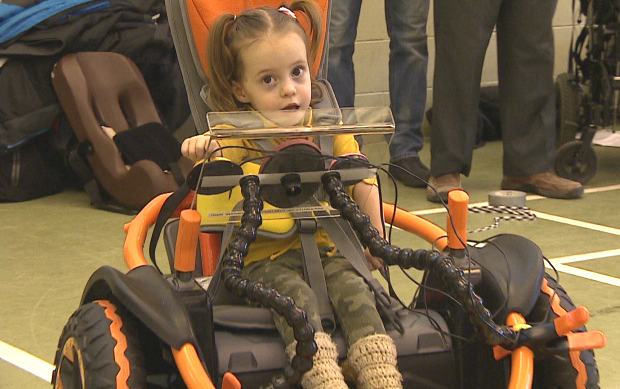Toy cars help kids with disabilities explore movement
Modified vehicles offer independence to children, hope to parents.

Khyla Buium, a two-year-old with cerebral palsy, along with her mom Julie were at the Wascana Rehabiliation Centre to demonstrate a modified ride-on car that was modified by University of Regina engineering graduate students. Troy Fleece, Regina Leader Post
By Kendall Latimer, CBC News Saskatchewan December 18, 2017
Glenn McIvor wasn’t sure his grandson would survive as a baby born with a rare genetic disease.
“We walked on eggshells whether he would make it through. We’d have ambulances showing up at our house on a regular basis,” he said.
But on Monday, he watched in excitement as Nickolia MacDonald-McIvor zoomed a car around the Wascana Rehabilitation Centre gymnasium.
Nickolia is four years old and has Joubert syndrome. The disorder affects many parts of his body, including his brain, mouth muscle tone and coordination.

Nickolia MacDonald-McIvor has to push a button to operate a modified car, which helps him work on his coordination. Mike Zartler, CBC
In therapy sessions, he works on techniques such as stopping, turning and hand movement.
“It helps him develop some of the other parts of his brain that maybe, because of his disease, that he would normally not have.”
A ride in the car is also a chance for Nickolia to play.
McIvor said his grandson has extremely limited coordination, but they’re seeing improvements after working with toy cars that were modified by graduate students at the University of Regina.
Smiling, McIvor referenced this past weekend’s visit to see St. Nick. “Santa was waving bye and you could see him bring his hand up and actually wave to Santa,” he said.

Khyla Buium, 2, has cerebral palsy, but she’s learning to cruise around in a car by pushing buttons. Mike Zartler CBC
| Modified cars create hope for parent |
Julie Buium’s two-year-old daughter, Khyla, has cerebral palsy, but she’s learning to cruise around in a car by pushing buttons.
“It affects every single muscle in her body, so she has to think extremely hard just to keep her head up, let alone swallow her saliva and push a button,” Buium said.
The cars give her daughter a sense of independence, a time to play and a chance for growth, she said.
“When she gets the opportunity to play like this, it makes it like almost more desirable — and so hopefully then she’ll try harder to move her muscles and hold her head and do these things because it’s fun,” she said.
When they learned she was born with the disease, the biggest fear for Buium was that Khyla would be unhappy.
“To see her happy and independent — which is a goal for me as a parent for her — is overwhelming,” she said, adding it gives her hope.
| Professor wants project funded |
The “early drivers” weren’t motivated by traditional forms of therapy, but that changed when they got a chance to drive, occupational therapist Kim Shawn said.
“All of a sudden — even when they weren’t in the blue car, they were trying to lift their head and control their trunk.”
The collaboration between the University of Regina Faculty of Engineering and Applied Science and Wascana Rehabilitation Centre Children Program began when Shawn approached Raman Paranjape, a professor in electronics systems engineering at the university.

Raman Paranjape was at the helm of the car conversion project. He said it’s been phenomenally gratifying to see the technology working and helping children. Kendall Latimer CBC
“It’s great for the grad students because they get the chance to actually build something that makes a difference,” he said. However, Paranjape wants the initiative funded. “Right now, it’s essentially done by volunteers and what they can scrape together. About $20,000 would be needed to commit a graduate student to the project, as well as about $10,000 for the parts.” Paranjape said.
While the cars are useful now, with funding, they could be turned into an evaluation tool to study the progress of the children. It could measure the length of time they hold the buttons, if they shake while pushing down, how they navigate barriers and how it changes over time.
![]() Source CBC News
Source CBC News
Also see
Specially modified cars for special kids The Regina Leader-Post
